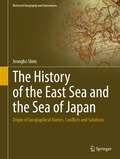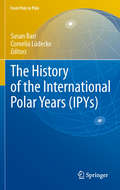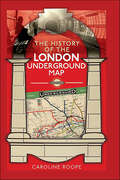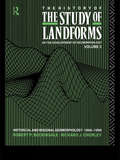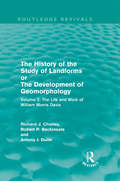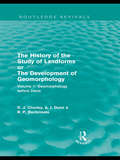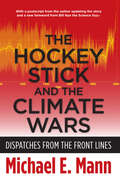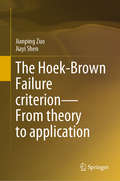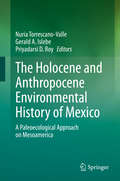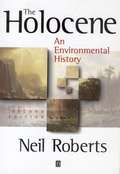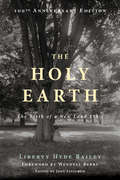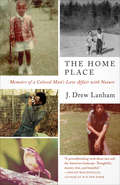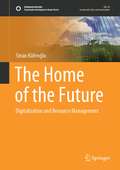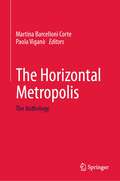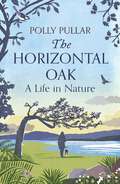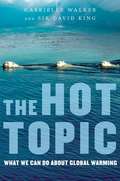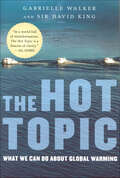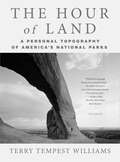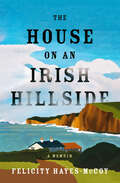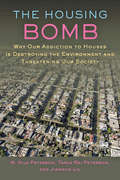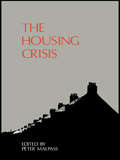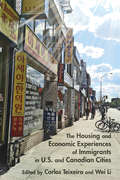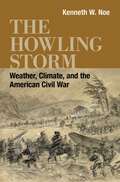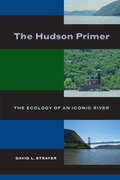- Table View
- List View
The History of the East Sea and the Sea of Japan: Origin of Geographical Names, Conflicts and Solutions (Historical Geography and Geosciences)
by Jeongbo ShimThis monograph discusses the dispute in geographical naming of the sea between Korea and Japan, which has been a long-lasting issue in East Asia and beyond. The book covers the modern history of the dispute, reveals the origin of the names for the sea between Korea and Japan, and the historical change of the name on ancient maps of Korea, Japan, and the West, and tracks the naming trends of the East Sea in geography textbooks in the pre-modern and modern times. The book also contains suggestions for some tangible solutions for the issue. This book is a useful resource for students and scholars in the fields of political geography, historical geography, cartography, diplomatic history, international relations, politics, and other related disciplines. It also appeals to international experts in hydrographic organizations and the United Nations, and geography and history teachers. The book is also interesting for the general readers interested in the topic of geographical naming disputes.
The History of the International Polar Years (IPYs)
by Cornelia Lüdecke Susan BarrAlthough international scientific cooperation - particularly in meteorology - was established previous to the first International Polar Year, the IPY-1 (1882-83) is considered to be the first revolutionary step towards an extensive international cooperation in the polar areas for the benefit of science rather than national prestige and territorial gain. This was followed by IPY-2 (1932-33) and IPY-3 - actually the International Geophysical Year (1957-58) - before the crowning effort of IPY-4 (2007-08). The history of these years is recounted here and explains the political, economic, technical and scientific conditions and expectations that laid the basis for each IPY and which gradually expanded both the scope and extent of our understanding of the complexities in polar regions
The History of the London Underground Map
by Caroline RoopeFew transportation maps can boast the pedigree that London’s iconic ‘Tube’ map can. Sported on t-shirts, keyrings, duvet covers, and most recently, downloaded an astonishing twenty million times in app form, the map remains a long-standing icon of British design and ingenuity. Hailed by the art and design community as a cultural artifact, it has also inspired other culturally important pieces of artwork, and in 2006 was voted second in BBC 2’s Great British Design Test. But it almost didn’t make it out of the notepad it was designed in. The story of how the Underground map evolved is almost as troubled and fraught with complexities as the transport network it represents. Mapping the Underground was not for the faint-hearted – it rapidly became a source of frustration, and in some cases obsession – often driving its custodians to the point of distraction. The solution, when eventually found, would not only revolutionise the movement of people around the city but change the way we visualise London forever. Caroline Roope’s wonderfully researched book casts the Underground in a new light, placing the world’s most famous transit network and its even more famous map in its wider historical and cultural context, revealing the people not just behind the iconic map, but behind the Underground’s artistic and architectural heritage. From pioneers to visionaries, disruptors to dissenters – the Underground has had them all – as well as a constant stream of (often disgruntled) passengers. It is thanks to the legacy of a host of reformers that the Tube and the diagram that finally provided the key to understanding it, have endured as masterpieces of both engineering and design.
The History of the Study of Landforms - Volume 3: Historical and Regional Geomorphology, 1890-1950 (Routledge Revivals: The History of the Study of Landforms)
by Richard J. Chorley Robert P. BeckinsaleThis volume provides a global treatment of historical and regional geomorphic work as it developed from the end of the nineteenth century to the hiatus of the Second World War. The book deals with the burgeoning of the eustatic theory, the concepts of isostasy and epeirogeny, and the first complete statements of the cycle of erosion and of polycyclic denudation chronology.
The History of the Study of Landforms Volume 2: The Life and Work of William Morris Davis (Routledge Revivals: The History of the Study of Landforms)
by R. P. Beckinsale Mrs R Chorley R. J. Chorley A J Dunn A. J. DunnThis volume is entirely devoted to the life and work of the world's most famous geomorphologist, William Morris Davis (1850-1934). It contains a treatment in depth of Davis' many contributions to the study of landforms including: the cycle of erosion denudation chronology arid and karst geomorphology the coral reef problem.
The History of the Study of Landforms: or the Development of Geomorphology (Routledge Revivals: The History of the Study of Landforms)
by Richard J. Chorley Robert P. Beckinsale Antony J. DunnThis re-issue, first published in 1964, is the first of a seminal series analysing the development of the study of landforms, from both the geographical and geological point of view, with especial emphasis upon fluvial geomorphology. Volume 1 treats the subject up to the first important statement of the cycle of erosion by W. M. Davis in 1889, and attempts to identify the most significant currents of geomorphic thought, integrating them into the broader contemporary intellectual frameworks with which they were associated. As well as dealing with such key figures as Werner, De Saussure, Hutton, Playfair, Buckland, lyell, Agassiz, Ramsay, Dana, Peschel, Powell, Gilbert and Davis, attention is also given to many less important contributions by American, British and continental workers. A spirited biographical treatment, attractively set off by contemporary portraits, diagrams and sketches, will make this book of great interest to the historian of science, and indeed to the general reader, as well as to the student and scholar in geomorphology, hydrology and any other earth science.
The Hockey Stick and the Climate Wars
by Michael E. MannThe ongoing assault on climate science in the United States has never been more aggressive, more blatant, or more widely publicized than in the case of the Hockey Stick graph-a clear and compelling visual presentation of scientific data, put together by MichaelE. Mann and his colleagues, demonstrating that global temperatures have risen in conjunction with the increase in industrialization and the use of fossil fuels. Here was an easy-to-understand graph that, in a glance, posed a threat to major corporate energy interests and those who do their political bidding. The stakes were simply too high to ignore the Hockey Stick-and so began a relentless attack on a body of science and on the investigators whose work formed its scientific basis.The Hockey Stick achieved prominence in a 2001 UN report on climate change and quickly became a central icon in the "climate wars." The real issue has never been the graph's data but rather its implied threat to those who oppose governmental regulation and other restraints to protect the environment and planet. Mann, lead author of the original paper in which the Hockey Stick first appeared, shares the story of the science and politics behind this controversy. He reveals key figures in the oil and energy industries and the media frontgroups who do their bidding in sometimes slick, sometimes bare-knuckled ways. Mann concludes with the real story of the 2009 "Climategate" scandal, in which climate scientists' emails were hacked. This is essential reading for all who care about our planet's health andour own well-being.
The Hockey Stick and the Climate Wars: Dispatches from the Front Lines
by Michael MannThe ongoing assault on climate science in the United States has never been more aggressive, more blatant, or more widely publicized than in the case of the Hockey Stick graph—a clear and compelling visual presentation of scientific data, put together by MichaelE. Mann and his colleagues, demonstrating that global temperatures have risen in conjunction with the increase in industrialization and the use of fossil fuels. Here was an easy-to-understand graph that, in a glance, posed a threat to major corporate energy interests and those who do their political bidding. The stakes were simply too high to ignore the Hockey Stick—and so began a relentless attack on a body of science and on the investigators whose work formed its scientific basis.The Hockey Stick achieved prominence in a 2001 UN report on climate change and quickly became a central icon in the "climate wars." The real issue has never been the graph's data but rather its implied threat to those who oppose governmental regulation and other restraints to protect the environment and planet. Mann, lead author of the original paper in which the Hockey Stick first appeared, shares the story of the science and politics behind this controversy. He reveals key figures in the oil and energy industries and the media frontgroups who do their bidding in sometimes slick, sometimes bare-knuckled ways. Mann concludes with the real story of the 2009 "Climategate" scandal, in which climate scientists' emails were hacked. This is essential reading for all who care about our planet's health and our own well-being.
The Hoek-Brown Failure criterion—From theory to application
by Jianping Zuo Jiayi ShenThis book provides a comprehensive coverage of the theory and principle of the Hoek-Brown (HB) failure criterion, methods or guidelines for estimating the HB input parameters, and the methodology of application of the HB criterion in rock engineering projects. It aims to help researchers, engineers and research students who work in the area of rock mechanics and mining engineering. Academics can quickly obtain an overview of the state of the art of the theory and principle of the Hoek-Brown criterion by reading the book before they advance their researches on the topics related to rock failure criteria. Geotechnical engineers can select appropriate Hoek-Brown input parameters for the design and analysis of rock engineering projects with the help of the principles introduced in this book. Research students may use the book as a textbook to learn the principle of rock mechanics related to rock mass properties.
The Holocene and Anthropocene Environmental History of Mexico: A Paleoecological Approach on Mesoamerica
by Nuria Torrescano-Valle Gerald A. Islebe Priyadarsi D. RoyThis book provides essential information on Mexico’s Holocene and Anthropocene climate and vegetation history. Considering the geography of Mexico – which is home to a variety of climatic and environmental conditions, from desert and tropical to high mountain climates – this book focuses on its postglacial paleoecology and paleoclimatology. Further, it analyses human intervention since the middle Holocene as a major agent of environmental change. Offering a valuable tool for understanding past climate change and its relationship with present climate change, the book is a must-read for botanists, ecologists, palaeontologists and graduate students in related fields.
The Holocene: An Environmental History
by Neil RobertsIn its first edition, The Holocene provided undergraduates with a much-needed coherent scientific account of the great transformation of nature that had taken place during the Holocene, the last 10,000 years in the history of the planet and the period in which we are all now living. This period has included major shifts in climate and human culture, and in the natural environment at every level. Completely revised and updated to take full account of the most recent advances, the new edition of this established text includes substantial material on scientific progress in the understanding of climate change and abrupt climatic events, of disturbance effects on the landscape, and of ice core records. Not only have improved dating methods, such as luminescence, been included but the timescale for the book has been moved to calendar (i.e. real) years. Coverage and supporting case study material have also been broadened and extended.
The Holy Earth: The Birth of a New Land Ethic
by Wendell Berry Liberty Hyde Bailey John LinstromThe agrarian tradition runs as an undercurrent through the entire history of literature, carrying the age-old wisdom that the necessary access of independent farmers to their own land both requires the responsibility of good stewardship and provides the foundation for a thriving civilization. At the turn of the last century, when farming first began to face the most rapid and extensive series of changes that industrialization would bring, the most compelling and humane voice representing the agrarian tradition came from the botanist, farmer, philosopher, and public intellectual Liberty Hyde Bailey. In 1915, Bailey's environmental manifesto, The Holy Earth, addressed the industrialization of society by utilizing the full range of human vocabulary to assert that the earth's processes and products, because they form the governing conditions of human life, should therefore be understood not first as economic, but as divine. To grasp the extent of human responsibility for the earth, Bailey called for "a new hold" that society must take to develop a "morals of land management," which would later inspire Aldo Leopold's "land ethic" and several generations of agrarian voices. This message of responsible land stewardship has never been as timely as now.
The Home Place: Memoirs of a Colored Man's Love Affair with Nature
by J. Drew Lanham&“A groundbreaking work about race and the American landscape, and a deep meditation on nature…wise and beautiful.&”—Helen Macdonald, author of H is for Hawk A Foreword Reviews Best Book of the Year and Nautilus Silver Award Winner In me, there is the red of miry clay, the brown of spring floods, the gold of ripening tobacco. All of these hues are me; I am, in the deepest sense, colored. Dating back to slavery, Edgefield County, South Carolina—a place &“easy to pass by on the way somewhere else&”—has been home to generations of Lanhams. In The Home Place, readers meet these extraordinary people, including Drew himself, who over the course of the 1970s falls in love with the natural world around him. As his passion takes flight, however, he begins to ask what it means to be &“the rare bird, the oddity.&” By turns angry, funny, elegiac, and heartbreaking, The Home Place is a meditation on nature and belonging by an ornithologist and professor of ecology, at once a deeply moving memoir and riveting exploration of the contradictions of black identity in the rural South—and in America today. &“When you&’re done with The Home Place, it won&’t be done with you. Its wonders will linger like everything luminous.&”—Star Tribune &“A lyrical story about the power of the wild…synthesizes his own family history, geography, nature, and race into a compelling argument for conservation and resilience.&”—National Geographic
The Home of the Future: Digitalization and Resource Management (Sustainable Development Goals Series)
by Sinan KüfeoğluThis book presents an in-depth study to show that a sustainable future urban life is possible. To build a safer and more sustainable future, as humankind, we would like to use more renewable energy, increase energy efficiency, reduce our carbon and water footprints in all economic sectors. The increasing population and humans’ ever-increasing demand for consumption pose another question whether the world’s resources are sufficient for present and future generations. Fair access to water, energy, and food is the objective for all. In line with the United Nations Sustainable Development Goals, scientists, researchers, engineers, and policymakers worldwide are working hard to achieve these objectives. To answer all these challenges, we would like to introduce the core of Smart Cities of the future, the building block of the future’s urban life: Open Digital Innovation Hub (ODIH). ODIH will serve as the ‘Home of the Future’, a fully digitalised and smart, self-sustaining building that answers all the motivation we highlight here. In ODIH, we introduce a living space that produces its water, energy, and food by minimising carbon and water footprints thanks to the Internet of Things, Artificial Intelligence, and Blockchain technologies. It will also serve as an open innovation environment for start-ups and entrepreneurs who wish to integrate their solutions into the infrastructure of ODIH and test those in real-time. We believe this will be a true open innovation test-bed for new business models.
The Horizontal Metropolis: The Anthology
by Paola Viganò Martina Barcelloni CorteThis book draws together classic and contemporary texts on the “Horizontal Metropolis” concept. Taking an interdisciplinary approach, it explores various theoretical, methodological and political implications of the Horizontal Metropolis hypothesis. Assembling a series of textual and cartographic interventions, this book explores those that supersede inherited spatial ontologies (urban/rural, town/country, city/non-city, society/nature). It investigates the emergence of a new type of extended urbanity across regions, territories and continents up to the global scale through the reconstruction of a fundamental but neglected tradition. This book responds to the radical nature of the changes underway today, calling for a rethinking of the Western Metropolis idea and form along with the emergence of new urban paradigms. The Horizontal Metropolis concept represents an ambitious attempt to offer new instruction to take on this challenge at the global scale. The book is intended for a wide audience interested in the emergence and development of new approaches in urbanism, architecture, cultural theory, urban and design education, landscape urbanism and geography.
The Horizontal Oak: A Life in Nature
by Polly PullarPeppered with humour, empathy and kindness' - Sunday Post Ever since her pet sheep Lulu accompanied her to school at the age of seven, animals and nature have been at the heart of Polly Pullar’s world. Growing up in a remote corner of the Scottish West Highlands, she roamed freely through the spectacular countryside and met her first otters, seals, eagles and wildcats. But an otherwise idyllic childhood was marred by family secrets which ultimately turned to tragedy. Following the suicide of her alcoholic father and the deterioration of her relationship with her mother, as well as the break-up of her own marriage, Polly rebuilt her life, earning a reputation as a wildlife expert and rehabilitator, journalist and photographer. This is her extraordinary, inspirational story. Written with compassion, humour and optimism, Polly reflects on how her love of the natural world has helped her find the strength to forgive and understand her parents, and to find an equilibrium.
The Hot Topic: What We Can Do About Global Warming
by Gabrielle Walker David KingA book that explains the science behind global warming, the most cutting-edge technological solutions from small to large, and the national and international politics that will affect our efforts
The Hot Topic: What We Can Do about Global Warming
by Gabrielle Walker David KingOne of the most dynamic writers and one of the most respected scientists in the field of climate change offer the first concise guide to both the problems and the solutions of global warming. Guiding us past a blizzard of information and misinformation, Gabrielle Walker and Sir David King explain the science of warming, the most cutting-edge technological solutions from small to large, and the national and international politics that will affect our efforts. While there have been many other books about the problem of global warming, none has addressed what we can and should do about it so clearly and persuasively, with no spin, no agenda, and no exaggeration. Neither Walker nor King is an activist or politician, and theirs is not a generic green call to arms. Instead they propose specific ideas to fix a very specific problem. Most important, they offer hope: This is a serious issue, perhaps the most serious that humanity has ever faced. But we can still do something about it. And they’ll show us how.
The Hour Of Land: A Personal Topography Of America's National Parks
by Terry Tempest WilliamsAmerica’s national parks are breathing spaces in a world in which such spaces are steadily disappearing, which is why more than 300 million people visit the parks each year. Now Terry Tempest Williams, the New York Times bestselling author of the environmental classic Refuge and the beloved memoir When Women Were Birds, returns with The Hour of Land, a literary celebration of our national parks and an exploration of what they mean to us and what we mean to them. From the Grand Tetons in Wyoming to Acadia in Maine to Big Bend in Texas, Williams creates a series of lyrical portraits that illuminate the unique grandeur of each place while delving into what it means to shape a landscape with its own evolutionary history into something of our own making. Part memoir, part natural history, and part social critique, The Hour of Land is a meditation and a manifesto on why wild lands matter to the soul of America.
The House on an Irish Hillside: A Memoir
by Felicity Hayes-McCoy&“A lovely writer, far superior to the average memoirist. . . . A curious mind, a perceptive observer with an artist&’s eye, a seeker of truth and beauty.&” —Irish IndependentFrom the moment I crossed the mountain, I fell in love with the place, which was more beautiful than any I&’d ever seen. And with a way of looking at life that was deeper, richer and wiser than any I&’d known before. . . . From the first day I came here I always knew I&’d come back. Sometimes we have to go back to our beginnings to become the person we want to be. More than a decade ago, USA Today–bestselling author Felicity Hayes-McCoy left the hectic pace of London and returned to her home country of Ireland to forge a new life in a remarkable house on the stunning Dingle peninsula. Gorgeously written, this is a life-affirming tale of rediscovering lost values and remembering the things that matter most. &“Wise, funny and touching, this book is a portrait of friendships, customs and folklore of Ireland; but what stays with you is harder to catch, like smoke or running water. It is the taste of something we all once knew, ever-present if only you look for it.&” ―Joanna Lumley, actress and author of Absolutely: A Memoir &“The book glowed . . . when I finished reading, I felt a sense of well-being, wonder and delight.&” —Alice Taylor, bestselling author of To School Through the FieldsPraise for Felicity Hayes-McCoy &“A pitch-perfect delight.&” —Marian Keyes, international bestselling author of Grown Ups on The Transatlantic Book Club &“The spot-on descriptions of Ireland&’s country roads and expansive sky all but leap off the page. . . . Maeve Binchy and Patrick Taylor fans will find much to enjoy.&” —Booklist on The Library at the Edge of the World &“Sunshine on the page.&” —Cathy Kelly, bestselling author of Between Sisters on The Month of Borrowed Dreams
The Housing Bomb: Why Our Addiction to Houses Is Destroying the Environment and Threatening Our Society
by Jianguo Liu M. Nils Peterson Tarla PetersonHow our thirst for more and larger houses is undermining society and what we can do about it.Have we built our way to ruin? Is your desire for that beach house or cabin in the woods part of the environmental crisis? Do you really need a bigger home? Why don’t multiple generations still live under one roof? In The Housing Bomb, leading environmental researchers M. Nils Peterson, Tarla Rai Peterson, and Jianguo Liu sound the alarm, explaining how and why our growing addiction to houses has taken the humble American dream and twisted it into an environmental and societal nightmare. Without realizing how much a contemporary home already contributes to environmental destruction, most of us want bigger and bigger houses and dream of the day when we own not just one dwelling but at least the two our neighbor does. We push our children to "get out on their own" long before they need to, creating a second household where previously one existed. We pave and build, demolishing habitat needed by threatened and endangered species, adding to the mounting burden of global climate change, and sucking away resources much better applied to pressing societal needs. "Reduce, reuse, recycle" is seldom evoked in the housing world, where economists predict financial disasters when "new housing starts" decline and the idea of renovating inner city residences is regarded as merely a good cause. Presenting irrefutable evidence, this book cries out for America and the world to intervene by making simple changes in our household energy and water usage and by supporting municipal, state, national, and international policies to counter this devastation and overuse of resources. It offers a way out of the mess we are creating and envisions a future where we all live comfortable, nondestructive lives. The "housing bomb" is ticking, and our choice is clear—change our approach or feel the blast.
The Housing Crisis
by Mr David AlexanderFirst published in 1986. Routledge is an imprint of Taylor & Francis, an informa company.
The Housing and Economic Experiences of Immigrants in U.S. and Canadian Cities
by Wei Li Carlos TeixeiraSince the 1960s, new and more diverse waves of immigrants have changed the demographic composition and the landscapes of North American cities and their suburbs. The Housing and Economic Experiences of Immigrants in U.S. and Canadian Cities is a collection of essays examining how recent immigrants have fared in getting access to jobs and housing in urban centres across the continent.Using a variety of methodologies, contributors from both countries present original research on a range of issues connected to housing and economic experiences. They offer both a broad overview and a series of detailed case studies that highlight the experiences of particular communities. This volume demonstrates that, while the United States and Canada have much in common when it comes to urban development, there are important structural and historical differences between the immigrant experiences in these two countries.
The Howling Storm: Weather, Climate, and the American Civil War (Conflicting Worlds: New Dimensions of the American Civil War)
by Kenneth W. NoeTraditional histories of the Civil War describe the conflict as a war between North and South. Kenneth W. Noe suggests it should instead be understood as a war between the North, the South, and the weather. In The Howling Storm, Noe retells the history of the conflagration with a focus on the ways in which weather and climate shaped the outcomes of battles and campaigns. He further contends that events such as floods and droughts affecting the Confederate home front constricted soldiers’ food supply, lowered morale, and undercut the government’s efforts to boost nationalist sentiment. By contrast, the superior equipment and open supply lines enjoyed by Union soldiers enabled them to cope successfully with the South’s extreme conditions and, ultimately, secure victory in 1865. Climate conditions during the war proved unusual, as irregular phenomena such as El Niño, La Niña, and similar oscillations in the Atlantic Ocean disrupted weather patterns across southern states. Taking into account these meteorological events, Noe rethinks conventional explanations of battlefield victories and losses, compelling historians to reconsider long-held conclusions about the war. Unlike past studies that fault inflation, taxation, and logistical problems for the Confederate defeat, his work considers how soldiers and civilians dealt with floods and droughts that beset areas of the South in 1862, 1863, and 1864. In doing so, he addresses the foundational causes that forced Richmond to make difficult and sometimes disastrous decisions when prioritizing the feeding of the home front or the front lines. The Howling Storm stands as the first comprehensive examination of weather and climate during the Civil War. Its approach, coverage, and conclusions are certain to reshape the field of Civil War studies.
The Hudson Primer: The Ecology of an Iconic River
by David L. StrayerThis succinct book gives an intimate view of the day-to-day functioning of a remarkable river that has figured prominently in history and culture--the Hudson, a main artery connecting New York, America, and the world. Writing for a wide audience, David Strayer distills the large body of scientific information about the river into a non-technical overview of its ecology. Strayer describes the geography and geology of the Hudson and its basin, the properties of water and its movements in the river, water chemistry, and the river's plants and animals. He then takes a more detailed look at the Hudson's ecosystems and each of its major habitats. Strayer also discusses important management challenges facing the river today, including pollution, habitat destruction, overfishing, invasive species, and ecological restoration.
